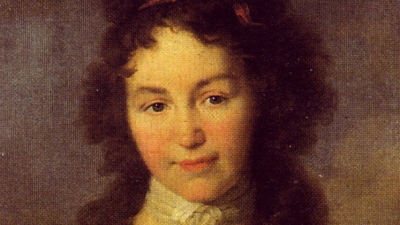
The title of the essay Über die Diotima (hereafter, the ‘Essay’ (translation here (pp400-419))) by Friedrich Schlegel (hereafter, ‘Friedrich’) suggests it is focused on Plato’s portrayal of Diotima in the Symposium. That portrayal, though, is but a starting point for Friedrich, who attempts to demonstrate that Diotima was a particular type of woman he associates with other ancient Greek women, including Sappho. The Essay is ostensibly of little relevance today, largely because knowledge of ancient Greece has evolved substantially since Friedrich’s time. In particular, a compelling case has been made that far from being related to ancient Greek women, Diotima is a fictional figure used by Plato “to vanquish Sappho” (Jantzen, Foundations of Violence, p193).
Yet, the Diotima Friedrich principally had in mind was not the one in Plato’s Symposium, but rather Caroline Schelling (hereafter ‘Caroline’), who was–for a time–his sister in law. On the third anniversary of his meeting Caroline he wrote a letter to her, reminding her of that anniversary and thanking her “for everything you have done for me and my development” (Caroline was almost a decade older than Friedrich, who was then in his early 20s, and yet to establish a name for himself as a scholar). Towards the end of his letter he asks her to read the Essay “once more and mark in pencil those passages in which you believe a small change might be necessary.” While his ‘once more’ suggests Caroline had previously given him input, the fact that in a letter to her from almost a year earlier Frederick refers to her, somewhat flirtatiously, as the “independent Diotima” relative to her ‘god’ (Frederick’s brother, August) confirms his identification of her with the subject of the Essay.
An appreciation of the importance of this requires some familiarity with Caroline’s background. She was the oldest daughter of a prominent philologist (Johann Michaelis); in addition to her native German she was fluent in French by the age of 15 and a year later had learned enough Italian to begin translating a comedy; she eventually became fluent in English and went on to translate Shakespeare’s Romeo and Juliet into German with such skill that it was then, and still is today, considered a model for translating English into German; she was having her daughter Auguste, who was the only one of her four children to live more than a few years after birth, learn ancient Greek–before she died of an illness at the age of 15.
The fact that Caroline wanted Auguste to learn ancient Greek is especially telling. It was rare for girls then to study Classical languages: to have her daughter do so was revolutionary. Caroline herself seems to have regretted not learning Greek, complaining in one letter of there not being a good translation of Plato. This demonstrates how keenly interested she was in some of the issues raised in the Essay. Indeed, it is worth wondering whether Friedrich’s request to Caroline was a polite way for him to have her confirm that he was quoting her accurately.
For example, in the Essay ‘Friedrich’ says “[t]he gift of being able to hear the tenderest sounds of nature from within and to communicate purely is . . . of immeasurable worth; and who would deny this of women?”(p410). That picks up on a comment ‘he’ makes earlier where one of two elements that “perhaps” define femininity is characterized as Innigkeit (‘inner sense’–attested earliest in Mechthild of Magdeburg)(p408). That hardly sounds like Plato’s Diotima or Plato’s many ‘footnotes’–but it does sound like Caroline. Though ‘Innigkeit’ does not appear in her letters, closely analogous principles can be found. In a letter from when she was only 15, Caroline writes to a friend about “the sensations of my heart” (die Empfindungen meines Herzens), sensations, she confesses, “I will never find the adequate words to express completely.”
In confessing to her limitations in expressing herself she ironically manifests her sophisticated sensitivity to the primacy of the experience of all sensations with respect to what she eventually says about them. She insists, however, “my thoughts are always the result of reflections that I undertake with — if at all possible — a completely cool disposition.” Thus, what she says evolves from an internal dialectic grounded in the experience of an inner sense. Accordingly, not only is there something unsaid in everything she says, but she seems to be conscious, in a manner no one before her was, of the unconscious.
Throughout her life Caroline appealed to this inner sense as what was authoritative for her and which she associated with feeling free and hence happy (German: glücklich, Latin: Faust(-us, -a). Because of how she related happiness and freedom to “the pure innermost flame of the soul” it also meant for her an awareness of an afterlife. A few months after Auguste died Caroline wrote of when “one day [we] become omnipresent ourselves, all of us, one in the other, yet without for that reason being ‘One’ . . . since then precisely our striving [das Streben] to become One would itself cease.”
Help in understanding what this means comes from an authoritative source: the recipient of the letter, Caroline’s third husband, FWJ Schelling. In a work he published shortly after Caroline’s death, there is a ‘fictional’ dialogue about an essence within each person that survives after death, uniting the past, present and future. The female participant, Clara (surely, Caroline), identifies that essence as being “the Innigkeit of consciousness.”
Decades later, Schelling proposed that Yoga in the Bhagavad Gita (BG) be translated Innigkeit (an apt but unprecedented and unparalleled translation discussed by Jason Wirth (p232)). Both the concept Innigkeit and the issue of translation implicate Caroline’s expertise and there is in fact evidence, albeit indirect, that Schelling’s proposal betrays her influence. Friedrich had included a partial and tendentious translation of BG in a book he published on ancient India in the Spring of 1808, a year before Caroline died. Notably absent from his BG are references to yogic practices. In a letter Schelling wrote to August in the Summer of 1808 he pointedly asked about Friedrich’s failure to discuss the relevance of the German pietist Jacob Boehme to BG. Boehme is relevant, especially with respect to what Friedrich excluded.
Caroline would not have raised the question directly with Friedrich, but she would have relished the opportunity to have her husband criticize him: years earlier she had complained to August about poetry by Friedrich she felt inappropriately alluded to her deceased daughter Auguste (see Letter 325 (footnote 3))–and from shortly thereafter his name never appears in her letters again.
 Stuart Dean has a B.A. (Tulane, 1976) and J.D. (Cornell, 1995) and is currently an independent researcher and writer living in New York City. He has studied, practiced and taught Tai Chi, Yoga and related disciplines for over forty years. Stuart has a blog on Sappho and the implications of her poetry for understanding the past, present and future: http://studysappho.blogspot.com/
Stuart Dean has a B.A. (Tulane, 1976) and J.D. (Cornell, 1995) and is currently an independent researcher and writer living in New York City. He has studied, practiced and taught Tai Chi, Yoga and related disciplines for over forty years. Stuart has a blog on Sappho and the implications of her poetry for understanding the past, present and future: http://studysappho.blogspot.com/


Her influence or unacknowledged use or stealing of her ideas?
LikeLike
I thought of your 4/20/2015 post on Unacknowledged Authorship several times as I have been researching Caroline. Because of Caroline’s many contacts she was apparently encouraged many times to write in her own name but chose not to (though I think she was conscious that her letters would be preserved and published eventually). With respect to her third husband Friedrich Schelling I think that it should be emphasized that because she was 12 years older than he was she at times writes to him as if she were his mother (in one letter she even characterizes herself as his mother and Goethe as his father). Her influence on him in this regard was well known to Schelling’s contemporaries. Formal acknowledgment of it probably seemed superfluous and not particularly helpful as she was despised for it by some (Hegel hated her)(this can be analogized to how some people perceived the influence of Yoko Ono on John Lennon). In my next post I am going to go into detail on the nature of her influence on Schelling’s famous essay on Human Freedom and how it relates to a critique of Platonic philosophy (and hence most of Western philosophy).
LikeLike
“Thus, what she says evolves from an internal dialectic grounded in the experience of an inner sense. Accordingly, not only is there something unsaid in everything she says, but she seems to be conscious, in a manner no one before her was, of the unconscious.”
Thanks, Stuart. Fascinating and beautiful this statement. But I think the “eternal dialectic” is too vague a term. Can you define it? I’m not questioning what you say, I’m actually trying to learn from you. There’s a poem by Zen Master Dogen (1200-1253), a great Zen teacher, which similarly intrigues me where he says:
“Who will gaze upon
The petals I flower
Springing free
As if it were only the music
Without the words of the song?”
LikeLike
Thank you. Perhaps I could have said that differently but I chose ‘dialectic’ deliberately to suggest the methodology of thinking of the 15 year old Caroline in fact anticipates a methodology of thought closely associated with two people she came to know and influence many years later–her husband Schelling and his friend Hegel. By “internal dialectic” I mean she starts with one or more feeling(s) that then leads to the desire to say something, but then she is confronted with the questions of whether it is even possible to come up with the words, whether to say them, how to say them, etc. All those questions need to be resolved until she in fact says something–therefore a dialogue with someone (another dialectic) is itself an outcome of a dialectic (this sort of dialectic built upon dialectic process is found throughout Schelling and Hegel’s writings).
LikeLike